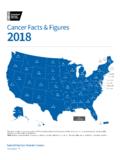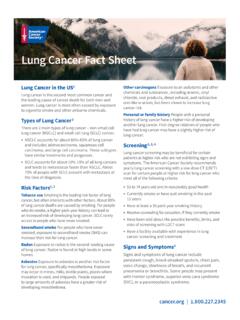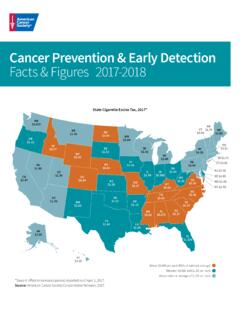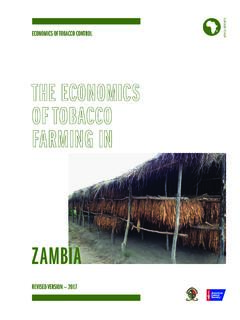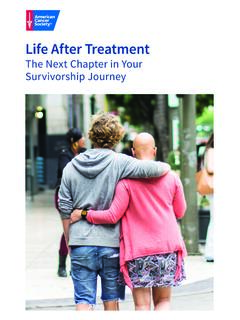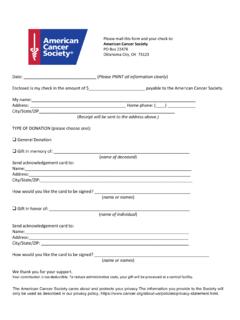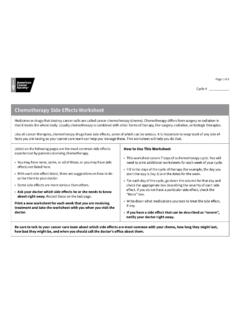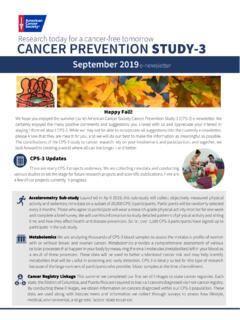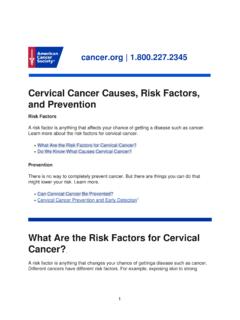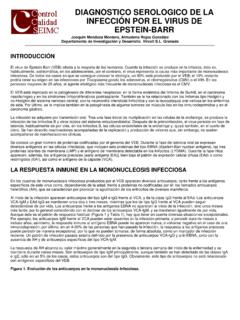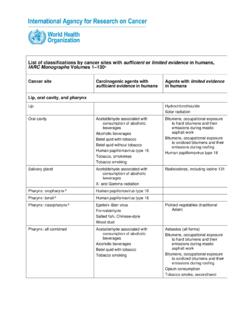Transcription of Prostate Cancer Causes, Risk Factors, and Prevention
1 Prostate Cancer Causes, Risk Factors, and Prevention | FactorsA risk factor is anything that increases your chances of getting a disease such ascancer. Learn more about the risk factors for Prostate Cancer Risk FactorslWhat Causes Prostate Cancer ?lPreventionThere is no sure way to prevent Prostate Cancer . But there are things you can do thatmight lower your risk. Learn Prostate Cancer Be Prevented?lProstate Cancer Risk Factors A risk factor is anything that raises your risk of getting a disease such as cancers have different risk factors. Some risk factors, like smoking, can bechanged.
2 Others, like a person s age or family history, can t be having a risk factor, or even several, does not mean that you will get the Cancer | people with one or more risk factors never get Cancer , while others who getcancer may have had few or no known risk have found several factors that might affect a man s risk of getting Cancer is rare in men younger than 40, but the chance of having prostatecancer rises rapidly after age 50. About 6 in 10 cases of Prostate Cancer are found inmen older than Cancer develops more often in African american men and in Caribbean men ofAfrican ancestry than in men of other races.
3 And when it does develop in these men,they tend to be younger. Prostate Cancer occurs less often in Asian american andHispanic/Latino men than in non-Hispanic whites. The reasons for these racial andethnic differences are not Cancer is most common in North America, northwestern Europe, Australia, andon Caribbean islands. It is less common in Asia, Africa, Central America, and reasons for this are not clear. More intensive screening for Prostate Cancer in somedeveloped countries probably accounts for at least part of this difference, but otherfactors such as lifestyle differences (diet, etc.)
4 Are likely to be important as well. Forexample, Asian Americans have a lower risk of Prostate Cancer than white Americans,but their risk is higher than that of men of similar ethnic backgrounds living in historyProstate Cancer seems to run in some families, which suggests that in some casesthere may be an inherited or genetic factor1. Still, most Prostate cancers occur in menwithout a family history of a father or brother with Prostate Cancer more than doubles a man s risk of2 american Cancer | this disease. (The risk is higher for men who have a brother with the diseasethan for those who have a father with it.)
5 The risk is much higher for men with severalaffected relatives, particularly if their relatives were young when the Cancer was changesSeveral inherited gene changes (mutations) seem to raise Prostate Cancer risk, but theyprobably account for only a small percentage of cases overall. For example:Inherited mutations of the BRCA1 or BRCA2 genes, which are linked to anincreased risk of breast and ovarian cancers in some families, can also increaseprostate Cancer risk in men (especially mutations in BRCA2).lMen with Lynch syndrome (also known as hereditary non-polyposis colorectalcancer, or HNPCC), a condition caused by inherited gene changes, have anincreased risk for a number of cancers, including Prostate inherited gene changes can also raise a man s risk of Prostate Cancer .
6 For moreon some of these gene changes, see What Causes Prostate Cancer ?Factors with less clear effects on Prostate Cancer riskDietThe exact role of diet in Prostate Cancer is not clear, but several factors have who eat a lot of dairy products appear to have a slightly higher chance of gettingprostate studies have suggested that men who consume a lot of calcium (through food orsupplements) may have a higher risk of developing Prostate Cancer . But most studieshave not found such a link with the levels of calcium found in the average diet, and it simportant to note that calcium is known to have other important health obese2 (very overweight) does not seem to increase the overall risk of gettingprostate Cancer | studies have found that obese men have a lower risk of getting a low-grade(slower growing) form of the disease, but a higher risk of getting more aggressive (fastergrowing) Prostate Cancer .
7 The reasons for this are not studies have also found that obese men may be at greater risk for having moreadvanced Prostate Cancer and of dying from Prostate Cancer , but not all studies havefound studies have not found a link between smoking3 and getting Prostate research has linked smoking to a possible small increased risk of dying fromprostate Cancer , but this finding needs to be confirmed by other exposuresThere is some evidence that firefighters can be exposed to chemicals that mayincrease their risk of Prostate few studies have suggested a possible link between exposure to Agent Orange, achemical used widely during the Vietnam War, and the risk of Prostate Cancer , althoughnot all studies have found such a link.
8 The National Academy of Medicine considersthere to be limited/suggestive evidence of a link between Agent Orange exposure andprostate Cancer . To learn more, see Agent Orange and of the prostateSome studies have suggested that prostatitis (inflammation of the Prostate gland) maybe linked to an increased risk of Prostate Cancer , but other studies have not found sucha link. Inflammation is often seen in samples of Prostate tissue that also contain link between the two is not yet clear, and this is an active area of transmitted infectionsResearchers have looked to see if sexually transmitted infections (like gonorrhea orchlamydia) might increase the risk of Prostate Cancer , because they can lead toinflammation of the Prostate .
9 So far, studies have not agreed, and no firm conclusionshave been Cancer | studies have suggested that men who have had a vasectomy (minor surgery tomake men infertile) have a slightly increased risk for Prostate Cancer , but other studieshave not found this. Research on this possible link is still under HH, Nelson PS. Genetic risk factors for Prostate Cancer . UpToDate. at March 19, Cancer Institute. Physician Data Query (PDQ). Prostate Cancer Accessed at March 21, Cancer Institute. SEER Cancer Stat Facts: Prostate Cancer . Accessed on March 19, WG, Antonarakis ES, Carter HB, DeMarzo AM, DeWeese TL.
10 Chapter 81: Prostate Cancer . In: Niederhuber JE, Armitage JO, Doroshow JH, Kastan MB, TepperJE, eds. Abeloff's Clinical Oncology. 6th ed. Philadelphia, Pa: Elsevier; CL, Thomson C, Gansler T, et al. american Cancer society guideline for diet andphysical activity for Cancer Prevention . CA Cancer J Clin. 2020;70(4). Accessed on June 9, AO. Risk factors for Prostate Cancer . UpToDate. 2019. Accessed on March 19, MM, Wilson KM, epstein MM, et al. Vasectomy and risk of aggressive prostatecancer: A 24-year follow-up study. J Clin Oncol. 2014;32 Cancer | MJ, Morris MJ, Eastham JA.
